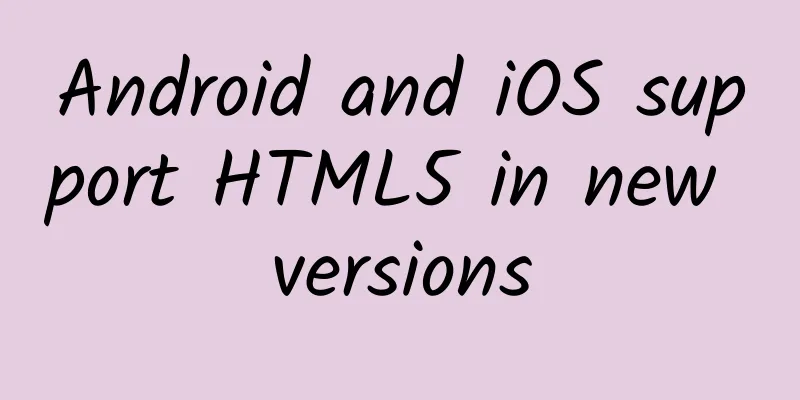Android and iOS support HTML5 in new versions

|
The two largest mobile operating systems, Android and iOS, are likely to prepare to add support for HTML5 in their latest versions. Google stripped WebView from the core components of Android and turned it into an upgradeable component. At the same time, Apple replaced the previous UIWebView with WKWebView, which has advantages in performance, stability and functionality in hybrid applications. Hybrid apps are similar to native apps. They are also installed from Google Play or the App Store, but they are developed using technologies such as HTML, CCS, and JavaScript. A browser engine is used to parse, run, and display these apps, and each operating system exports an API for the engine to interact with it. In Android, this engine is WebView, and in iOS it is called WKWebView. Developers can embed web content in their apps and access resources that regular mobile websites cannot access, such as the camera, file system, and NFC. WebView has always been a core component of Android, and it was previously updated only when the operating system was upgraded. Since the release speed of Android versions is generally slow and the pace of each manufacturer is different, not all mobile phones and tablets can be upgraded to the latest version at the same time (if they really need to be upgraded), which results in users being unable to use the latest features or being threatened by security vulnerabilities. After the release of KitKat, the Chrome development team acknowledged this problem and planned to turn the browser engine into a regularly updated component. Starting with Android Lollipop, there is a new feature called Upgradable WebView. As the name implies, this WebView can now be updated from Google Play as a regular app. This not only ensures that important security updates can be deployed to devices in a timely manner, but also enables new features and APIs to be pushed to developers of applications that rely on WebView in a timely manner. Apple is also trying to support more HTML5 features in iOS 8. One notable thing is to use WKWebView to replace the old engine UIWebView. In previous iOS versions, hybrid apps could not reach the JavaScript performance level of native Safari apps because Apple restricted the use of Safari's JavaScript engine Nitro, making UIWebView slow. Now with the WKWebView API, hybrid apps running on iOS 8 can take advantage of the same optimizations as the Safari browser. Benchmarks show that JavaScript in these apps is 4.5 times faster than the old UIWebView API. But the new API has a bug that can break some hybrid apps, starting with beta 4. In addition to this major change, iOS 8 also supports the following HTML5 features: WebGL IndexedDB HTML templates Navigation/high-precision timing CCS shape SVG fragment identifier You can check out this article for details on the specific improvements to WKWebView. Link to this article: http://www.cocoachina.com/webapp/20141121/10277.html |
<<: Android Studio 1.0 RC released
>>: Longer term trends of the top 10 programming languages ranking (1989-2014)
Recommend
Jurong SEO Training: Is SEO optimization of trade websites easy? Are pop-up ads useful?
Foreign trade websites are literally different fr...
How much does it cost to apply for a 400 number? How much does it cost to make a 400 phone call?
How much does it cost to apply for a 400 number? ...
Good news! The golden period for weight loss has arrived
Some time ago 40 degrees high temperature frequen...
The marketing hotspot for the whole year of 2018, a must-have for operators and promoters! !
In the blink of an eye, it is the end of 2017 aga...
How to plan a high-quality operational activity plan?
1. Tell a story first Let's assume a scenario...
Will Martians obey Earth’s control in the future? Can Musk’s Mars colonization plan be realized?
This article is based on answering similar questi...
How to make the Jiayuguan clothing store mini program? How to build a clothing WeChat applet?
Open the APP on your phone, no matter which e-com...
Why don't cats meow much to each other?
You may have seen these two "training" ...
First full-brain map of insects completed
An international team led by Johns Hopkins Univer...
Traffic pool promotion and marketing, 6 tips to teach you how to acquire customers at low cost!
What I want to talk about are the 6 core ideas ab...
New Media Operations: This is a topic selection guide that may help you write 10w+ articles!
After two weeks of observation, I have read count...
Don't use your phone when you go to the toilet. It has more impact on your health than you think! I regret not knowing this earlier...
Nowadays, people may not remember to bring toilet...
How to create a hit title with over 100,000 views? Just master these 5 points!
Let’s take you to re-examine the meaning of title...
China's new energy vehicle sales increased by 19.3% year-on-year in July, but Tesla's sales in China fell by 24% month-on-month
Although China's new energy market has experi...









